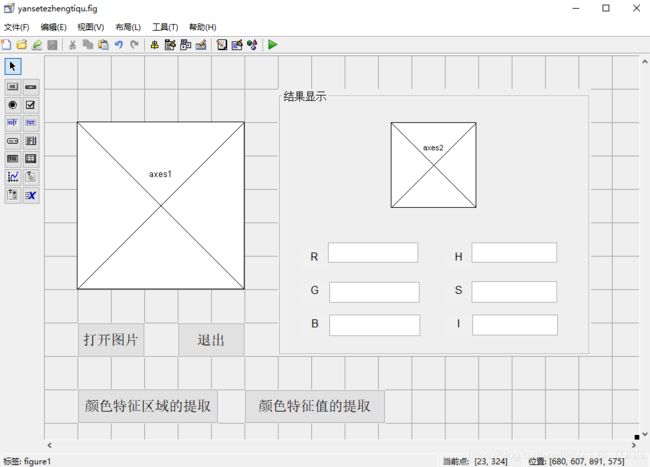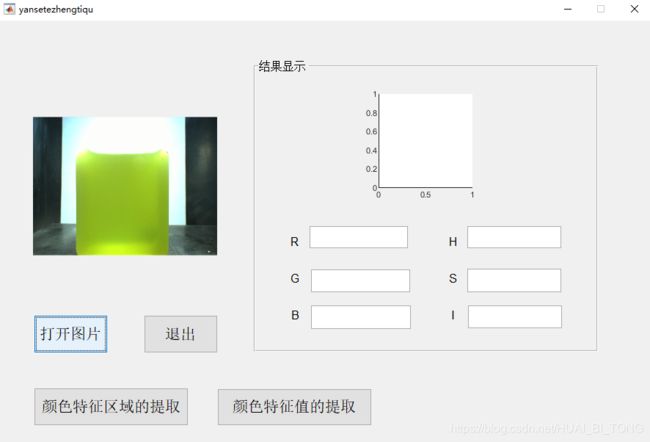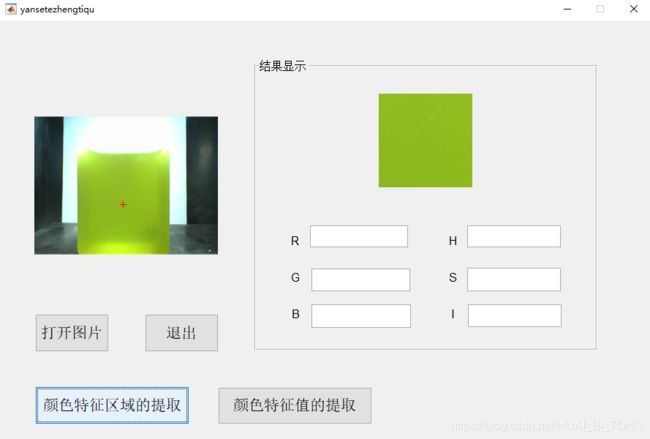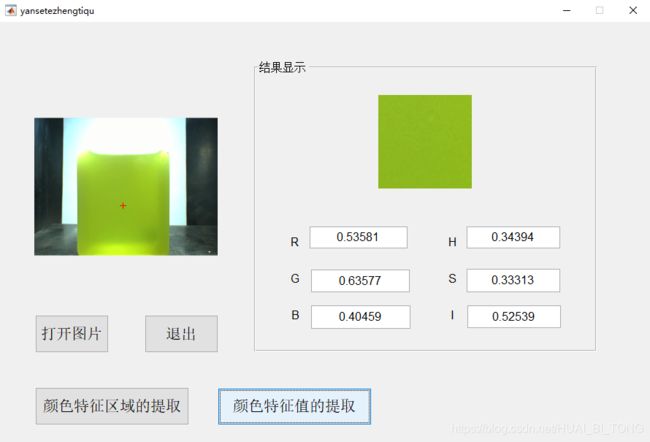基于MATLAB GUI的系统设计(八)
接下来学习的是关于颜色特征提取方面的知识。
颜色特征是在图像检索中应用最为广泛的视觉特征,主要原因在于颜色往往和图像中所包含的物体或场景十分相关。此外,与其他的视觉特征相比,颜色特征对图像本身的尺寸、方向、视角的依赖性较小,从而具有较高的鲁棒性。
颜色特征表示方法:
- 颜色直方图
颜色直方图是一种被普遍应用于大量图像检索系统的颜色特征表示方法,它描述了整幅图像中不同颜色所占的比例,但不关心每种颜色的空间位置,即不能描述图像中的对象。颜色直方图对表示那些不易自动分割的图像尤为合适。 - 颜色矩
颜色矩是一种非常行之有效的颜色特征表示方法,它有一阶矩、二阶矩和三阶矩等。因为图像的颜色信息基本都分布在低阶矩中,因此一阶矩、二阶矩和三阶矩已经足够描述图像的颜色信息分布。 - 颜色相关图
颜色相关图是颜色特征的另一种表示方法,可以用来表示颜色的空间分布,其本质是选取图像中颜色特征值为的像素作为参考,然后计算出与颜色特征值相距的颜色特征值的概率分布,该颜色特征不只是表示一种颜色的像素数占此幅图像的比例,而且表达了不同颜色分量间的空间联系。
颜色特征提取包括颜色特征区域的提取和颜色特征值的提取。
- 颜色特征区域的提取指对经过预处理后的图像通过选取目标区域的中心坐标,并截取符合要求大小的正方形区域作为颜色特征区域。
在二值图像中,目标区域的像素点是白色的,为有效区域,其他区域的像素点是黑色的,为无效区域,对二值图像中白色有效区域的所有像素点进行计数得到目标区域面积A,根据下列公式可求得目标的质心坐标。

上式中,S表示经过预处理后的二值图像中目标的区域。
[L,m]=bwlabel(Ibw,8);%标注二进制图像中连通部分
stats=regionprops(L,'Centroid');%求质心
centroids = cat(1, stats.Centroid);%获取每个连通域的质心坐标值
- 颜色特征值的提取指截取符合要求大小的正方形区域后,提取截取后图像的R、G、B、H、S、I分量值作为颜色特征值。
提取出的R、G、B、H、S、I分量值为矩阵,所以采用求矩阵均值的方式实现对颜色特征值的提取。
R=mean(r(:)); %计算RGB三个矩阵的均值
G=mean(g(:));
B=mean(b(:));
H=mean(H(:)); %计算HSI三个矩阵的均值
S=mean(S(:));
I=mean(I(:));
实例一: 在一张溶液图像中标记出溶液部分的中心点,以中心点为原点截取要求大小的正方形区域作为颜色特征区域,并提取出颜色特征区域的颜色特征值。
function varargout = yansetezhengtiqu(varargin)
% YANSETEZHENGTIQU MATLAB code for yansetezhengtiqu.fig
% YANSETEZHENGTIQU, by itself, creates a new YANSETEZHENGTIQU or raises the existing
% singleton*.
%
% H = YANSETEZHENGTIQU returns the handle to a new YANSETEZHENGTIQU or the handle to
% the existing singleton*.
%
% YANSETEZHENGTIQU('CALLBACK',hObject,eventData,handles,...) calls the local
% function named CALLBACK in YANSETEZHENGTIQU.M with the given input arguments.
%
% YANSETEZHENGTIQU('Property','Value',...) creates a new YANSETEZHENGTIQU or raises the
% existing singleton*. Starting from the left, property value pairs are
% applied to the GUI before yansetezhengtiqu_OpeningFcn gets called. An
% unrecognized property name or invalid value makes property application
% stop. All inputs are passed to yansetezhengtiqu_OpeningFcn via varargin.
%
% *See GUI Options on GUIDE's Tools menu. Choose "GUI allows only one
% instance to run (singleton)".
%
% See also: GUIDE, GUIDATA, GUIHANDLES
% Edit the above text to modify the response to help yansetezhengtiqu
% Last Modified by GUIDE v2.5 04-Aug-2019 14:42:19
% Begin initialization code - DO NOT EDIT
gui_Singleton = 1;
gui_State = struct('gui_Name', mfilename, ...
'gui_Singleton', gui_Singleton, ...
'gui_OpeningFcn', @yansetezhengtiqu_OpeningFcn, ...
'gui_OutputFcn', @yansetezhengtiqu_OutputFcn, ...
'gui_LayoutFcn', [] , ...
'gui_Callback', []);
if nargin && ischar(varargin{1})
gui_State.gui_Callback = str2func(varargin{1});
end
if nargout
[varargout{1:nargout}] = gui_mainfcn(gui_State, varargin{:});
else
gui_mainfcn(gui_State, varargin{:});
end
% End initialization code - DO NOT EDIT
% --- Executes just before yansetezhengtiqu is made visible.
function yansetezhengtiqu_OpeningFcn(hObject, eventdata, handles, varargin)
% This function has no output args, see OutputFcn.
% hObject handle to figure
% eventdata reserved - to be defined in a future version of MATLAB
% handles structure with handles and user data (see GUIDATA)
% varargin command line arguments to yansetezhengtiqu (see VARARGIN)
% Choose default command line output for yansetezhengtiqu
handles.output = hObject;
% Update handles structure
guidata(hObject, handles);
% UIWAIT makes yansetezhengtiqu wait for user response (see UIRESUME)
% uiwait(handles.figure1);
% --- Outputs from this function are returned to the command line.
function varargout = yansetezhengtiqu_OutputFcn(hObject, eventdata, handles)
% varargout cell array for returning output args (see VARARGOUT);
% hObject handle to figure
% eventdata reserved - to be defined in a future version of MATLAB
% handles structure with handles and user data (see GUIDATA)
% Get default command line output from handles structure
varargout{1} = handles.output;
function edit1_Callback(hObject, eventdata, handles)
% hObject handle to edit1 (see GCBO)
% eventdata reserved - to be defined in a future version of MATLAB
% handles structure with handles and user data (see GUIDATA)
% Hints: get(hObject,'String') returns contents of edit1 as text
% str2double(get(hObject,'String')) returns contents of edit1 as a double
% --- Executes during object creation, after setting all properties.
function edit1_CreateFcn(hObject, eventdata, handles)
% hObject handle to edit1 (see GCBO)
% eventdata reserved - to be defined in a future version of MATLAB
% handles empty - handles not created until after all CreateFcns called
% Hint: edit controls usually have a white background on Windows.
% See ISPC and COMPUTER.
if ispc && isequal(get(hObject,'BackgroundColor'), get(0,'defaultUicontrolBackgroundColor'))
set(hObject,'BackgroundColor','white');
end
function edit2_Callback(hObject, eventdata, handles)
% hObject handle to edit2 (see GCBO)
% eventdata reserved - to be defined in a future version of MATLAB
% handles structure with handles and user data (see GUIDATA)
% Hints: get(hObject,'String') returns contents of edit2 as text
% str2double(get(hObject,'String')) returns contents of edit2 as a double
% --- Executes during object creation, after setting all properties.
function edit2_CreateFcn(hObject, eventdata, handles)
% hObject handle to edit2 (see GCBO)
% eventdata reserved - to be defined in a future version of MATLAB
% handles empty - handles not created until after all CreateFcns called
% Hint: edit controls usually have a white background on Windows.
% See ISPC and COMPUTER.
if ispc && isequal(get(hObject,'BackgroundColor'), get(0,'defaultUicontrolBackgroundColor'))
set(hObject,'BackgroundColor','white');
end
function edit3_Callback(hObject, eventdata, handles)
% hObject handle to edit3 (see GCBO)
% eventdata reserved - to be defined in a future version of MATLAB
% handles structure with handles and user data (see GUIDATA)
% Hints: get(hObject,'String') returns contents of edit3 as text
% str2double(get(hObject,'String')) returns contents of edit3 as a double
% --- Executes during object creation, after setting all properties.
function edit3_CreateFcn(hObject, eventdata, handles)
% hObject handle to edit3 (see GCBO)
% eventdata reserved - to be defined in a future version of MATLAB
% handles empty - handles not created until after all CreateFcns called
% Hint: edit controls usually have a white background on Windows.
% See ISPC and COMPUTER.
if ispc && isequal(get(hObject,'BackgroundColor'), get(0,'defaultUicontrolBackgroundColor'))
set(hObject,'BackgroundColor','white');
end
function edit4_Callback(hObject, eventdata, handles)
% hObject handle to edit4 (see GCBO)
% eventdata reserved - to be defined in a future version of MATLAB
% handles structure with handles and user data (see GUIDATA)
% Hints: get(hObject,'String') returns contents of edit4 as text
% str2double(get(hObject,'String')) returns contents of edit4 as a double
% --- Executes during object creation, after setting all properties.
function edit4_CreateFcn(hObject, eventdata, handles)
% hObject handle to edit4 (see GCBO)
% eventdata reserved - to be defined in a future version of MATLAB
% handles empty - handles not created until after all CreateFcns called
% Hint: edit controls usually have a white background on Windows.
% See ISPC and COMPUTER.
if ispc && isequal(get(hObject,'BackgroundColor'), get(0,'defaultUicontrolBackgroundColor'))
set(hObject,'BackgroundColor','white');
end
function edit5_Callback(hObject, eventdata, handles)
% hObject handle to edit5 (see GCBO)
% eventdata reserved - to be defined in a future version of MATLAB
% handles structure with handles and user data (see GUIDATA)
% Hints: get(hObject,'String') returns contents of edit5 as text
% str2double(get(hObject,'String')) returns contents of edit5 as a double
% --- Executes during object creation, after setting all properties.
function edit5_CreateFcn(hObject, eventdata, handles)
% hObject handle to edit5 (see GCBO)
% eventdata reserved - to be defined in a future version of MATLAB
% handles empty - handles not created until after all CreateFcns called
% Hint: edit controls usually have a white background on Windows.
% See ISPC and COMPUTER.
if ispc && isequal(get(hObject,'BackgroundColor'), get(0,'defaultUicontrolBackgroundColor'))
set(hObject,'BackgroundColor','white');
end
function edit6_Callback(hObject, eventdata, handles)
% hObject handle to edit6 (see GCBO)
% eventdata reserved - to be defined in a future version of MATLAB
% handles structure with handles and user data (see GUIDATA)
% Hints: get(hObject,'String') returns contents of edit6 as text
% str2double(get(hObject,'String')) returns contents of edit6 as a double
% --- Executes during object creation, after setting all properties.
function edit6_CreateFcn(hObject, eventdata, handles)
% hObject handle to edit6 (see GCBO)
% eventdata reserved - to be defined in a future version of MATLAB
% handles empty - handles not created until after all CreateFcns called
% Hint: edit controls usually have a white background on Windows.
% See ISPC and COMPUTER.
if ispc && isequal(get(hObject,'BackgroundColor'), get(0,'defaultUicontrolBackgroundColor'))
set(hObject,'BackgroundColor','white');
end
% --- Executes on button press in open.
function open_Callback(hObject, eventdata, handles)
% hObject handle to open (see GCBO)
% eventdata reserved - to be defined in a future version of MATLAB
% handles structure with handles and user data (see GUIDATA)
[filename,pathname]=uigetfile({'*.bmp;*.jpg;*.png;*.jpeg;*.tif;*.gif;*.Image files'},'载入图像');%选择路径打开图像
str=[pathname filename]; %打开图像
im=imread(str); %打开axes1的句柄 进行axes1的操作
axes(handles.axes1); %在axes1中显示图像
imshow(im);
handles.img=im; %把图像发给handles.img
guidata(hObject,handles);%把handles句柄更新
% --- Executes on button press in quyu.
function quyu_Callback(hObject, eventdata, handles)
% hObject handle to quyu (see GCBO)
% eventdata reserved - to be defined in a future version of MATLAB
% handles structure with handles and user data (see GUIDATA)
%选取S分量
handles.img = im2double(handles.img);
r = handles.img(:, :, 1);
g = handles.img(:, :, 2);
b = handles.img(:, :, 3);
tmp1 = min(min(r, g), b);
tmp2 = r + g + b;
tmp2(tmp2 == 0) = eps;
S = 1 - 3.*tmp1./tmp2;
%阈值分割
level=graythresh(S);%使用最大类间方差法找到图片的一个合适的阈值
BW=im2bw(S,level); %Otsu阈值进行分割
%滤波
x=medfilt2(BW,[5 5],'symmetric');%中值滤波
%中心点坐标
Ibw=bwareaopen(x,100);%删除二值图像x中面积小于100的连通对象
hold on;
[L,m]=bwlabel(Ibw,8);%标注二进制图像中连通部分
stats=regionprops(L,'Centroid');%求质心
centroids = cat(1, stats.Centroid);%获取每个连通域的质心坐标值
a=centroids(:,1); %将质心坐标值x赋给a
b=centroids(:,2); %将质心坐标值y赋给b
c=a(a>600&a<700&b>600&b<700);
d=b(a>600&a<700&b>600&b<700);
for i=1:m
plot(c,d,'R+');
end
hold off;
%截取128×128的图片
[height,width]=size(x);
m=width/10; %剪切图像显示区域的1/x(以图像中心向四周剪切)
n=height/7.5;
rect=[c-m/2 d-n/2 m n];%计算裁剪区域:(以图像中心点为裁剪中心)
f=imcrop(handles.img,rect);% 用imcrop裁剪
axes(handles.axes2);
imshow(f);
set(handles.axes2,'units','pixels');
pos=get(handles.axes2,'pos');
pos(3:4)=[128 128];
set(handles.axes2,'pos',pos);
% --- Executes on button press in zhi.
function zhi_Callback(hObject, eventdata, handles)
% hObject handle to zhi (see GCBO)
% eventdata reserved - to be defined in a future version of MATLAB
% handles structure with handles and user data (see GUIDATA)
im = im2double(handles.img);%像素值被标准化到0—1
r = im(:, :, 1);
g = im(:, :, 2);
b = im(:, :, 3);
R=mean(r(:)); %计算RGB三个矩阵的均值
G=mean(g(:));
B=mean(b(:));
%I
I = (r + g + b)/3;
%S
tmp1 = min(min(r, g), b);
tmp2 = r + g + b;
tmp2(tmp2 == 0) = eps;
S = 1 - 3.*tmp1./tmp2;
%H
tmp1 = 0.5*((r - g) + (r - b));
tmp2 = sqrt((r - g).^2 + (r - b).*(g - b));
theta = acos(tmp1./(tmp2 + eps));
H = theta;
H(b > g) = 2*pi - H(b > g);
H = H/(2*pi);
H(S == 0) = 0;
H=mean(H(:)); %计算HSI三个矩阵的均值
S=mean(S(:));
I=mean(I(:));
set( handles. edit1 ,'string',num2str( R) );
set( handles. edit2 ,'string',num2str( G) );
set( handles. edit3 ,'string',num2str( B) );
set( handles. edit4 ,'string',num2str( H) );
set( handles. edit5 ,'string',num2str( S) );
set( handles. edit6 ,'string',num2str( I) );
% --- Executes on button press in exit.
function exit_Callback(hObject, eventdata, handles)
% hObject handle to exit (see GCBO)
% eventdata reserved - to be defined in a future version of MATLAB
% handles structure with handles and user data (see GUIDATA)
clc %清除指令窗
close all %关闭所有句柄可见的窗口
close(gcf) %关闭当前窗口
clear %清除内存变量和函数
第三步:运行。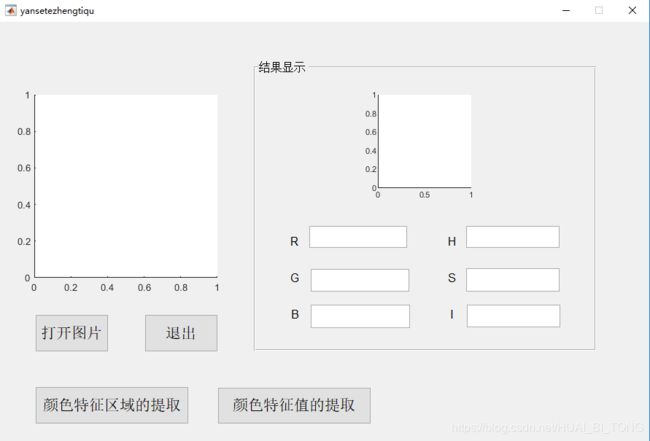 第四步:在完成GUI界面创建后,对所创建界面的效果进行试验。点击“打开图片”按钮在文件夹中选择一张需要处理的溶液图像,点击“颜色特征区域的提取”按钮可以在左边画布得到标记溶液区域中心点的溶液图像,在右边画布中得到截取后的颜色特征区域,点击“颜色特征值的提取”按钮可以在R、G、B、H、S、I对应的可编辑文本框中得到相应的颜色特征值,点击“退出”按钮可以退出界面。
第四步:在完成GUI界面创建后,对所创建界面的效果进行试验。点击“打开图片”按钮在文件夹中选择一张需要处理的溶液图像,点击“颜色特征区域的提取”按钮可以在左边画布得到标记溶液区域中心点的溶液图像,在右边画布中得到截取后的颜色特征区域,点击“颜色特征值的提取”按钮可以在R、G、B、H、S、I对应的可编辑文本框中得到相应的颜色特征值,点击“退出”按钮可以退出界面。
